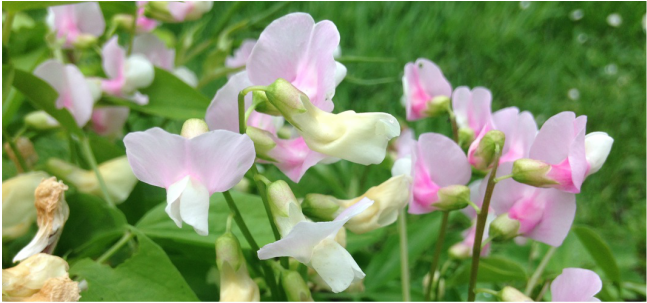June is the best month for sowing biennial plants such as wallflowers, foxgloves, sweet wiliams, Canterbury bells etc. They can be planted in seed trays and when big enough, planted in a seed bed ready for transferring outside in October.
In the flower garden deadhead lupins as soon as they fade and you will get some more spikes. Also look out for lupin aphids – they’re twice the size of normal greenfly and can devastate your plants.
If you planted dahlia cuttings, try to restrict your plant to a certain amount of shoots.
Knowing the size of the blooms will help you decide how many shoots to allow to grow.
Earwigs can make a nuisance of themselves by biting the flowers, which are fine if you’re using the cut flowers for the house but a no-no if you want to show them. An old-fashioned trap can be made by putting straw in a five or six inch pot and sticking them upside down on a bamboo cane next to your dahlias. Then every evening empty them into a bucket and shake the pots. You will catch dozens!
A bit of paraffin or diesel in the bucket will soon kill them.
I grow a lot of gladioli and they can be affected by thrips – a symptom can be flowers not opening properly. If this happens to you, you will have to spray next year. About the only systemic insecticide left to the amateur is Provado so that’s what to use!
In the vegetable garden if you plant out pants from pots, runner beans, marrows, courgettes, squashes, etc. They provide a veritable feast for slugs and snails. Put some slug pellets down as you don’t want all your hard work to go to feed pests!
I say to people who don’t have any success with brassicas, you must feed them as they need high nitrogen levels to do well. A straight high nitrogen fertilizer is ideal – nitro chalk nitram if you know a friendly farmer and can beg some. If you are organically inclined, then chicken pellets or fish blood and bone will always help. July is the best month to clip privet, hornbeam or beech hedges.
June 1st features a talk by Una Dunnett form the British Hosta and Hemerocallis Society on the wonderful variety of hostas, so do come along. We also need to finalise our list for our day coach trip to Wollerton Old Hall Garden on Wednesday July 6, by June, so please email info@bishamptongardeingclub.org.uk as soon as possible if you haven’t already done so!
The club is subsidizing the cost so at £15 it’s a real bargain – setting off at 9.30 am in the morning and returning around tea-time in the village.
The National Garden Scheme open gardens is now gaining momentum with lots open in June and July. You can pick up a Worcestershire county book for free; look at their website at www.ngs.org.uk, or download a new app they’ve recently launched. (http://www.ngs.org.uk/gardens/find-a-garden-app.aspx)
There’s a lot going on at Croome including openings of Britain’s largest walled garden (which is privately owned and therefore attracts a £5 entry fee); seehttp://www.nationaltrust.org.uk/whats-on for more information.
Our summer schedule is now available for our annual Summer Show on Saturday August 13 with final entries due on Friday 12 or a week earlier if you want to enter your pots and containers a these are judged in situ.
If you want a copy see me, one of the committee members; emailinfo@bishamptongardeningclub.org.uk or telephone 01386 861438.
In the flower garden deadhead lupins as soon as they fade and you will get some more spikes. Also look out for lupin aphids – they’re twice the size of normal greenfly and can devastate your plants.
If you planted dahlia cuttings, try to restrict your plant to a certain amount of shoots.
Knowing the size of the blooms will help you decide how many shoots to allow to grow.
Earwigs can make a nuisance of themselves by biting the flowers, which are fine if you’re using the cut flowers for the house but a no-no if you want to show them. An old-fashioned trap can be made by putting straw in a five or six inch pot and sticking them upside down on a bamboo cane next to your dahlias. Then every evening empty them into a bucket and shake the pots. You will catch dozens!
A bit of paraffin or diesel in the bucket will soon kill them.
I grow a lot of gladioli and they can be affected by thrips – a symptom can be flowers not opening properly. If this happens to you, you will have to spray next year. About the only systemic insecticide left to the amateur is Provado so that’s what to use!
In the vegetable garden if you plant out pants from pots, runner beans, marrows, courgettes, squashes, etc. They provide a veritable feast for slugs and snails. Put some slug pellets down as you don’t want all your hard work to go to feed pests!
I say to people who don’t have any success with brassicas, you must feed them as they need high nitrogen levels to do well. A straight high nitrogen fertilizer is ideal – nitro chalk nitram if you know a friendly farmer and can beg some. If you are organically inclined, then chicken pellets or fish blood and bone will always help. July is the best month to clip privet, hornbeam or beech hedges.
June 1st features a talk by Una Dunnett form the British Hosta and Hemerocallis Society on the wonderful variety of hostas, so do come along. We also need to finalise our list for our day coach trip to Wollerton Old Hall Garden on Wednesday July 6, by June, so please email info@bishamptongardeingclub.org.uk as soon as possible if you haven’t already done so!
The club is subsidizing the cost so at £15 it’s a real bargain – setting off at 9.30 am in the morning and returning around tea-time in the village.
The National Garden Scheme open gardens is now gaining momentum with lots open in June and July. You can pick up a Worcestershire county book for free; look at their website at www.ngs.org.uk, or download a new app they’ve recently launched. (http://www.ngs.org.uk/gardens/find-a-garden-app.aspx)
There’s a lot going on at Croome including openings of Britain’s largest walled garden (which is privately owned and therefore attracts a £5 entry fee); seehttp://www.nationaltrust.org.uk/whats-on for more information.
Our summer schedule is now available for our annual Summer Show on Saturday August 13 with final entries due on Friday 12 or a week earlier if you want to enter your pots and containers a these are judged in situ.
If you want a copy see me, one of the committee members; emailinfo@bishamptongardeningclub.org.uk or telephone 01386 861438.

